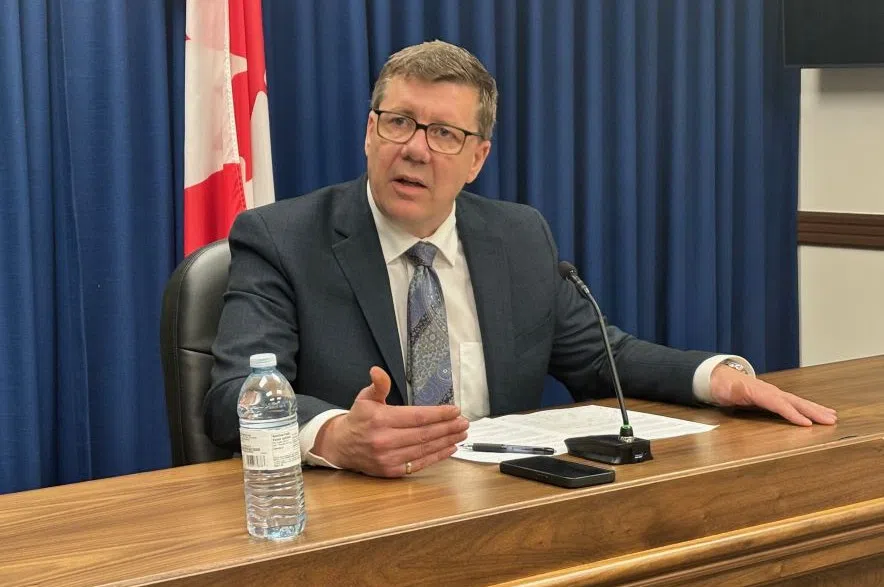Premier Scott Moe will visit China and Japan in early September as part of a trade mission aimed at deepening Saskatchewan’s ties with international food, agriculture and energy industry stakeholders.
It’s been six years since a Canadian premier went to China for a trade mission.
At the same time, Trade and Export Development Minister Warren Kaeding will lead a mission to South Korea and then join the premier in Japan. Keading says he sees a lot of opportunity to diversify Saskatchewan’s export markets in these countries.
Read more:
- Premier Scott Moe announces road upgrade to support Sask. canola crush facility
- Saskatchewan Premier Moe, federal minister to meet on China canola tariff
- Farmers call govt to take action against Chinese canola tariffs
Kaeding says Saskatchewan is committed to these missions because they bring back “real results” to the province’s citizens.
“Our government is working hard to navigate ongoing trade challenges, and our international trade and investment offices are the vital resource that will guide us through,” he said.
Moe invited Prime Minister Mark Carney, and any other federal ministers, to join him. The premier is calling the federal government to support the more than 200,000 people across Canada’s canola industry.
“That’s why we are leading through this mission, reinforcing future trade opportunities and engaging with China on these temporary duties before it’s too late.”
As of Aug. 21, there’s no commitment from either Prime Minister Mark Carney, Heath MacDonald, the federal agriculture minister, something that Moe said is vital to actually negotiating a potential new deal between China and Canada.
“It isn’t going to be Premier Moe and President Xi (Jinping) that stand up and say ‘we’ve come to a trade deal here and everything is good moving forward.’ It is going to be Prime Minister Mark Carney and President Xi (Jinping) that ultimately are going to speak on behalf of their countries,” said Moe during the news conference.
The province has had a trade office in China for the last eight years, and Moe talked about fostering and advancing relationships with Xi Jinping, China’s president.
“Saskatchewan is the obvious advocate, and the obvious province to support the federal government in starting these discussions on how we can have a more free and open access to the Chinese market for the canola products, yes, but also peas, as well as seafood and pork,” Moe said.
“It needs to start somewhere, and we’re suggesting it starts on the ground in China with our federal government, and we’re there to support them every step of the way.”
NDP Finance critic Trent Wotherspoon said it was well past time for Moe to work with the federal government and represent Saskatchewan’s interests in China.
Wotherspoon said the Chinese retaliatory tariffs on canola are causing large impacts and uncertainty for Saskatchewan producers.
The Chinese tariffs were placed on canola products in response to a 100 per cent levy placed on Chinese electric vehicles and a 25 per cent levy on steel and aluminium products last year.
“We’ve been clear all the way along that to resolve this – if that requires the federal government to take its tariff that they’ve placed on Chinese EVs off – we think that those (tariffs) should be scrapped to make sure that we can end the tariffs and duties on agricultural products that hit Saskatchewan producers and and our economy in such a such a disproportionate way,” Wotherspoon said.
Sask. stands united with canola producers
On Aug. 21, Premier Scott Moe met with provincial canola stakeholders and agriculture ministers to address the recent tariffs imposed by China on provincial canola exports in Saskatoon. They called on the federal government to take “quick, meaningful action” to resolve the current situation.
Moe met with Trade and Export Development Minister Warren Kaeding, Agriculture Minister Daryl Harrison, Federal Minister of Agriculture and Agri-Food Heath MacDonald and Parliamentary Secretary to the Prime Minister Kody Blois, at the University of Saskatchewan’s College of Agriculture building.
The Government of Saskatchewan condemns China’s punitive tariffs on canola, which directly impact Saskatchewan families,” Moe said in a news release. “This is an urgent situation for Saskatchewan producers and we must work together to find immediate solutions.”
Earlier this month, the Chinese government imposed a 76 per cent tariff on Canadian canola exports—on top of existing tariffs on canola oil and meal. These measures are widely seen as retaliatory, following Canada’s decision to place tariffs on Chinese electric vehicles.
“Saskatchewan is one of the largest canola producers in the world, supporting thousands of jobs and driving economic growth across Canada,” Moe added. “As a province that exports nearly 70 per cent of everything we produce, we will continue to champion free and fair global trade.
Sask Oilseeds chair weighs in on China trip
Dean Roberts, Chair of Sask Oilseeds, said he was happy to have a seat at the meeting table Aug. 21, and to finally get some engagement at a level that feels “appropriate.”
“This announcement is fairly fresh, but coming into harvest, it’s urgent for farmers. We need action, and we need it now while these duties are still preliminary,” he said.
Roberts said action meant engagement between the federal government and China at the highest levels.
“Anytime trade comes up, it’s a very complicated issue… there’s a lot of factors to consider,” he added.
At this point, he has not been invited to be part of the delegation to China, but his group will continue to engage with and share their perspective with the provincial government.
“Farmers are being used as a pawn in the current geopolitical environment. Unprecedented market closure amidst an already stressful time of year has a compounding adverse effect on farmers,” he said.
“Today’s dialogue with government leaders centred on practical solutions that could be activated to support farmers’ livelihood in the short-term.”
— with files from 980 CJME’s Daniel Reech











